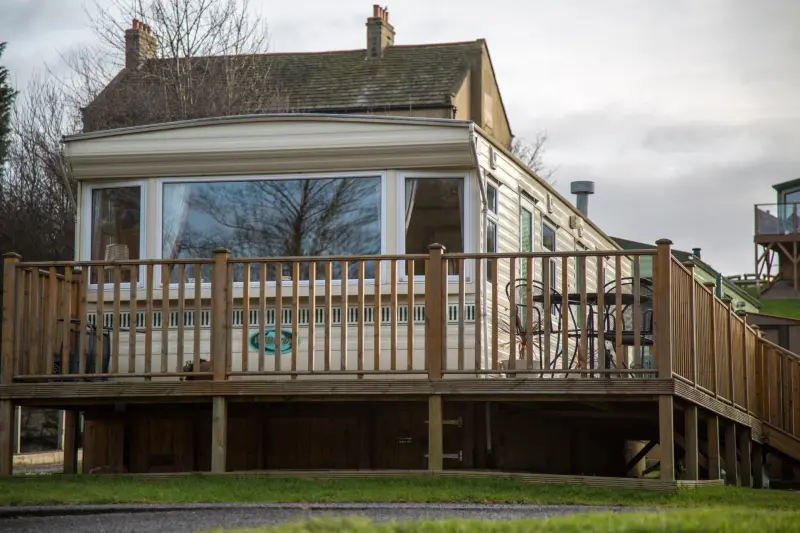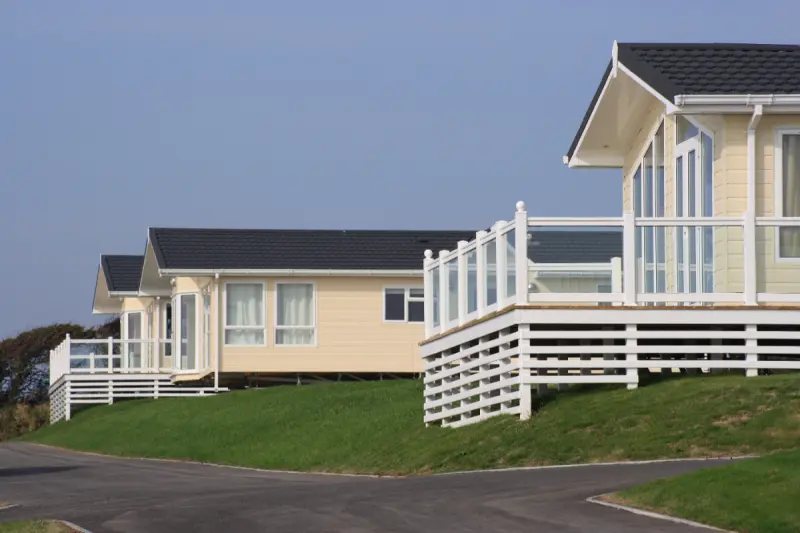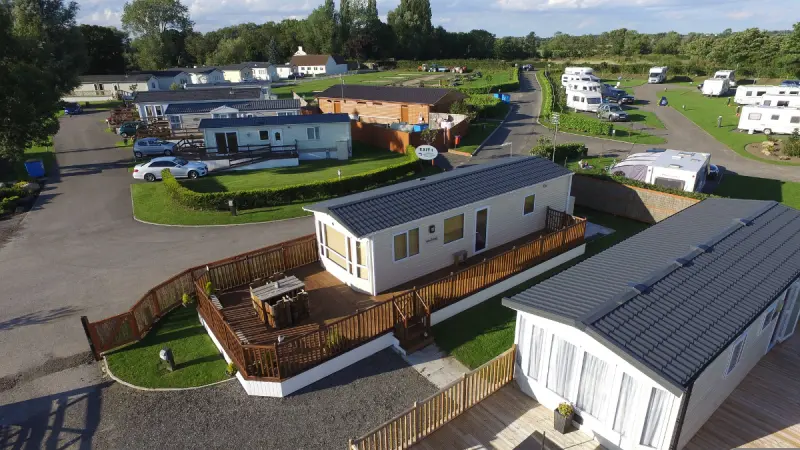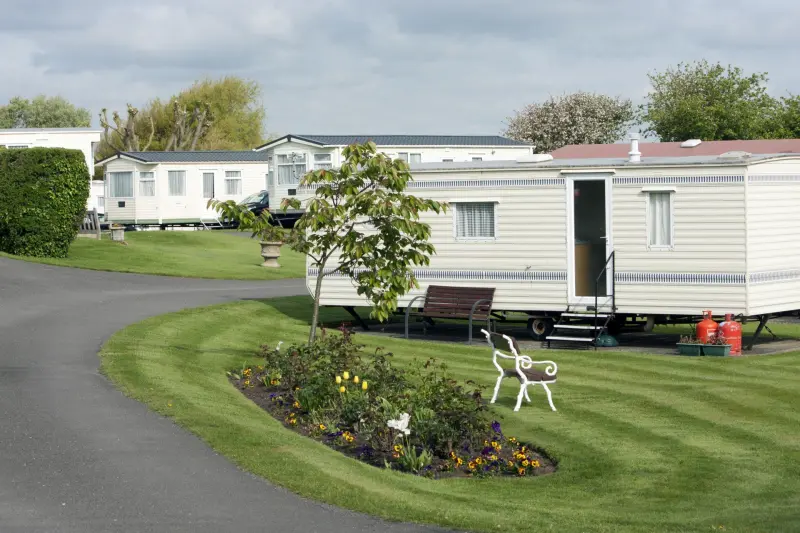Siting a caravan refers to the process of positioning or placing a caravan on a designated plot or pitch, typically within a caravan park or campsite. This includes securing the caravan, connecting utilities like water, electricity, and waste, and ensuring it is level and stable for comfortable use.
What does siting a caravan mean?
Siting a caravan refers to the process of placing a mobile home or static caravan in a specific location. These are to be used as a temporary or permanent living space. This can include setting it up on private land, dedicated parks, or holiday parks. The siting process involves transporting the caravan to the location, preparing the ground, and connecting all the essentials like water and electricity.
According to UK legislation, a caravan is defined as any structure designed or adapted for human habitation that can be moved by towing or other means. The legality of siting a caravan depends on various factors, such as permission and site licences. It's also essential to consider local regulations and restrictions, which may vary by council. Ensuring compliance with these rules helps avoid potential legal issues.
How to site a static caravan?
When siting a static caravan, several factors need to be considered:
Usage
Think about how the caravan will be used. Is it for residential purposes, holiday accommodation, or occasional use? The purpose will affect where and how it can be sited. Additionally, consider the amenities you will need, such as electrical and water connections.
Check local regulations to ensure your plans follow zoning and planning laws. Private Land If you plan to site the caravan on private land, check if you have the right planning permission.
Consult local authorities to make sure you follow permitted development rights. Failure to do so may result in enforcement action.

Holiday Parks
Holiday parks are a popular choice for siting caravans. They offer various facilities such as swimming pools, playgrounds, and entertainment venues. Often located in scenic areas, they provide an ideal setting for family vacations.
Staying at a holiday park allows you to enjoy nature while having access to modern amenities.
Transportation & Access
Ensure the chosen location is easily accessible for transporting the caravan. Roads need to be wide enough and free of obstructions. It’s also important to check for any low bridges or weight restrictions that could impede the journey.
This will guarantee a smooth and hassle-free transport experience.
Base
Prepare a level concrete base to support the caravan's structure. This ensures stability and prevents damage. Measure the area carefully, ensuring it is free of debris and obstructions.
Use a spirit level to check for evenness, and allow the concrete to harden fully before positioning the caravan on it.
Costs
When managing a project, it’s essential to consider all costs involved. These may include transportation, site fees, and connection charges for amenities. We recommend factoring in insurance, permits, and any unexpected expenses.
Planning for these expenses can help avoid financial surprises and keep your budget on track, ensuring smooth project execution.
Dedicated Park
Dedicated parks are specifically designed for static caravans. These parks provide essential amenities that you may need or enjoy. Parks have their fair share of rules and regulations to ensure your caravan complies with all legal requirements.
They offer electricity, water, and waste disposal facilities, ensuring your stay is comfortable and easy. This type of park also often includes security measures, such as gated entries, to keep you safe.

Do I need legal permission to site my caravan?
Yes, siting a caravan often requires legal permission, particularly if you intend to use it as a residential caravan or within a specific development area. Planning permission from your local council may be required, and you'll need to adhere to the site licence rules. The type of land, its zoning, and its intended use are crucial factors that determine the necessity of planning permission.
Different councils may have varying requirements, so it’s advisable to get in touch with your local planning office to ask specific questions. Ignoring these rules could lead to enforcement action, which might include fines or the order to remove the caravan from the site. It's important to ensure compliance with local regulations, as they protect you from potential legal issues and make your stay hassle-free.
Always prioritise understanding the guidelines set to prevent any inconvenient surprises. It's better to be informed and prepared than to face unexpected complications.
How to set up your caravan
Setting up a caravan involves several steps to ensure it is ready for use:
Positioning
Once the caravan is transported to the location, align it properly on the pre-prepared base to ensure stability. Check all corners and sides meticulously, making sure it is level and firm.
Then, secure it by locking the stabilisers in place to avoid any potential movement or tilting in the future.
Levelling
Use a spirit level to check that the caravan is level. Adjust as necessary using stabilisers, blocks, or jacks to maintain even ground contact. Ensure all wheels are chocked to prevent movement during levelling.
Always double-check the level from various points inside the caravan to ensure it remains steady and secure.
Connection
Connect the caravan to all necessary utilities like water, electricity, and gas. Make sure all connections are secure to avoid leaks or power issues.
Check that all fixtures and appliances are properly functioning by turning them on and inspecting for any faults. Regularly maintain and test connections to ensure ongoing safety and efficiency.

Anchoring
Ensure the caravan is firmly anchored, especially in windy locations. This prevents movement and potential structural damage. Regularly inspect the anchoring points for any signs of wear or weakness. You must consider using heavy-duty straps for extra security.
Safe anchoring helps maintain stability, keeping you and your belongings safe during adverse weather conditions.
Internal Setup
To ensure comfort, set up internal amenities such as seating, cooking facilities, and sleeping areas. Additionally, include proper lighting for visibility and relaxation. Ensure ventilation keeps the air fresh.
Storage areas for personal items and equipment can also be helpful. These steps create a homely, efficient environment.
Useful checklists for caravans
To help keep everything in order, consider useful checklists:
Pre-Purchase Checklist: Before buying a caravan, check its condition, any required repairs, and the warranty. Ensure it meets your needs and budget. Inspect the tyres, brakes, and electrics. Verify the appliances and fixtures to avoid future hassles. Reading online reviews and consulting experienced owners can also provide valuable insights.
Setup Checklist: Include all the steps for site preparation, transport, and setup on this list. This ensures nothing is missed and the process goes smoothly.
Maintenance Checklist: Regular checks for wear and tear, necessary replacements, and cleaning tasks help prolong the life of your caravan. Include checks on brakes, tyres, and utility connections. Make sure you inspect the roof for any potential leaks, examine the electrical systems for safety, and test all appliances to ensure they are working correctly. Don't forget to check the battery and replace it if necessary.
Seasonal Checklist: Prepare for changes in weather by checking insulation, heating systems, and weatherproofing. This helps maintain comfort and prevents weather-related damage. Frequently inspect your roof for leaks, clean gutters to avoid blockages, and ensure windows and doors are sealed properly. Pay attention to your garden, securing any outdoor furniture or decorations. Taking these steps can save you from costly repairs.
Safety Checklist: Ensure all safety devices like smoke alarms, carbon monoxide detectors, and emergency exits are functional. Regular safety checks can prevent accidents and save lives. It's important to test these devices monthly and replace batteries as needed. Report any malfunctions to the relevant authorities immediately. Maintenance of these devices is crucial for safety.
In summary, siting a caravan involves various steps and considerations. These include obtaining legal permissions to ensure proper setup and maintenance. By following these guidelines and referring to the provided resources, you can smoothly transition your caravan from transport to a comfortable living or holiday space.
Are you looking for caravan and mobile home siting services in Devon, Cornwall and South West England? If you require mobile home siting and transport, get in contact with our professional team.

